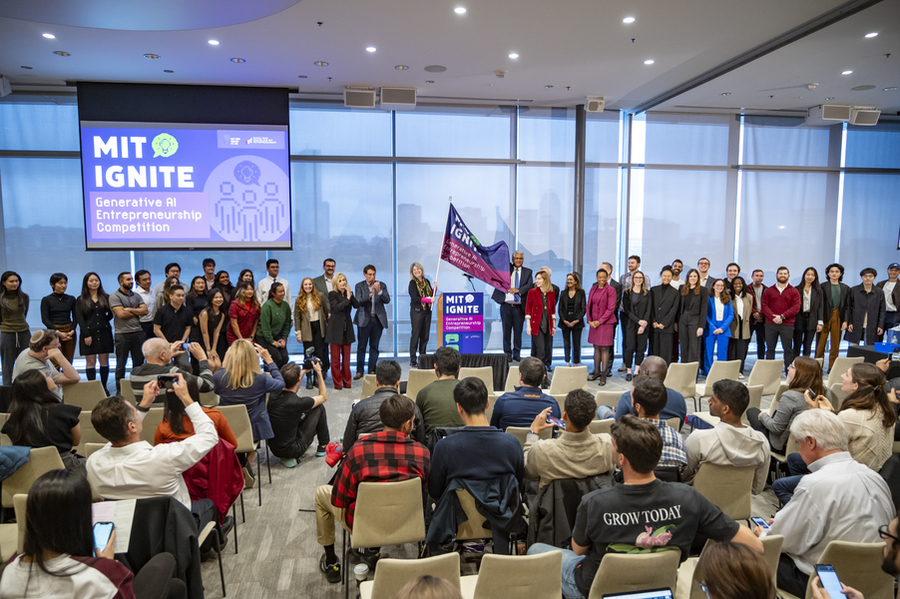IDEAS 2023 Finalist, Sunona (formerly PocketChart), Receives an Inaugural MIT Ingnite Flagship Prize!
Read more about Sunona (formerly PocketChart) here!

Photo: Christopher Harting
This semester, students and postdocs across MIT were invited to submit ideas for the first-ever MIT Ignite: Generative AI Entrepreneurship Competition. Over 100 teams submitted proposals for startups that utilize generative artificial intelligence technologies to develop solutions across a diverse range of disciplines including human health, climate change, education, and workforce dynamics.
On Oct. 30, 12 finalists pitched their ideas in front of a panel of expert judges and a packed room in Samberg Conference Center.
“MIT has a responsibility to help shape a future of AI innovation that is broadly beneficial — and to do that, we need a lot of great ideas. So, we turned to a pretty reliable source of great ideas: MIT’s highly entrepreneurial students and postdocs,” said MIT President Sally Kornbluth in her opening remarks at the event.
The MIT Ignite event is part of a broader focus on generative AI at MIT put forth by Kornbluth. This fall, across the Institute, researchers and students are exploring opportunities to contribute their knowledge on generative AI, identifying new applications, minimizing risks, and employing it for the benefit of society. This event — co-organized by the MIT-IBM Watson AI Lab and the Martin Trust Center for MIT Entrepreneurship, and supported by MIT’s School of Engineering and the MIT Sloan School of Management — inspired young researchers to contribute to the dialogue and innovate in generative AI.
Serving as co-chairs for the event were Aude Oliva, MIT director of the MIT-IBM Watson AI Lab and a principal investigator in the Computer Science and Artificial Intelligence Laboratory (CSAIL); Bill Aulet, the Ethernet Inventors Professor of the Practice at the MIT Sloan School of Management and director of the Martin Trust Center; and Dina Katabi, the Thuan (1990) and Nicole Pham Professor in the Department of Electrical Engineering and Computer Science, director of the Center for Wireless Networks and Mobile Computing, and a CSAIL principal investigator.
Twelve teams of students and postdocs were competing for a number of prizes, including five MIT Ignite Flagship Prizes of $15,000 each, a special first-year undergraduate student team Flagship Prize, and runner-up prizes. All prizes were provided by the MIT-IBM AI Watson Lab. Teams were judged on their project’s innovative applications of generative AI, feasibility, potential for real-world impact, and the quality of presentation.
After the 12 teams showcased their technology, its potential to address an issue, and the team’s ability to execute the plan, a panel of judges deliberated. As the audience waited for the results, remarks were made by Mark Gorenberg ’76, chair of the MIT Corporation; Anantha Chandrakasan, dean of the MIT School of Engineering and the Vannevar Bush Professor of Electrical Engineering and Computer Science; and David Schmittlein, the John C. Head III Dean and professor of marketing at the MIT Sloan School of Management. The student winners included:
MIT Ignite Flagship Prizes
eMote (Philip Cherner, Julia Sebastien, Caroline Lige Zhang, and Daeun Yoo): Sometimes identifying and expressing emotions is difficult, particularly for those on the alexithymia spectrum; further, therapy can be expensive. eMote’s app allows users to identify their emotions, visualize them as art using the co-creative process of generative AI, and reflect on them through journaling, thereby assisting school counselors and therapists.
LeGT.ai (Julie Shi, Jessica Yuan, and Yubing Cui): Legal processes around immigration can be complicated and costly. LeGT.ai aims to democratize legal knowledge. Using a platform with a large language model, prompt engineering, and semantic search, the team will streamline a chatbot for completion, research, and drafting of documents for firms, as well as improve pre-screening and initial consultations.
Sunona (Emmi Mills, Selin Kocalar, Srihitha Dasari, and Karun Kaushik): About half of a doctor’s day is consumed by medical documentation and clinical notes. To address this, Sunona harnesses audio transcription and a large language model to transform audio from a doctor’s visit into notes and feature extraction, affording providers more time in their day.
UltraNeuro (Mahdi Ramadan, Adam Gosztolai, Alaa Khaddaj, and Samara Khater): For about one in seven adults, spinal cord injury, stroke, or disease will induce motor impairment and/or paralysis. UltraNeuro’s neuroprosthetics will help patients to regain some of their daily abilities without invasive brain implants. Their technology leverages an electroencephalogram, smart sensors, and a multimodal AI system (muscle EMG, computer vision, eye movements) trained on thousands of movements to plan precise limb movements.
UrsaTech (Rui Zhou, Jerry Shan, Kate Wang, Alan He, and Rita Zhang): Education today is marked by disparities and overburdened educators. UrsaTech’s platform uses a multimodal large language model and diffusion models to create lessons, dynamic content, and assessments to assist teachers and learners. The system also has immersive learning with AI agents for active learning for online and offline use.
Tags: Health, Health & Medicine, IDEAS, PKG Alumni
